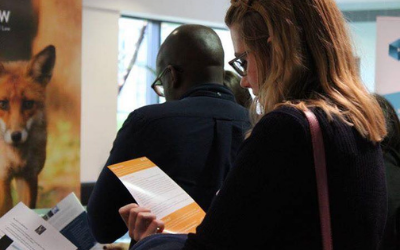By Rachel O’Connell, animal law student through the Open University at Åbo Akademi University
The campaign
After more than a year of extensive research, non-profit Humane Being has launched the world’s first legal challenge against a government to end factory farming.
The entirely volunteer run group behind the campaign to ‘Scrap Factory Farming’ cite animal suffering, climate chaos, degradation of the planet, the dangers of antibiotic resistance, and pandemic risk. They describe how ‘unhygienic factory farms are the perfect breeding ground for these diseases’ and call for an end to factory farming and the subsidies it receives from public funds.[i]
Key facts
- The most recent figures, from 2017, report that there are 1,674 intensive factory farms in the UK including 789 mega-farms[ii] *
- In 2020 the government gave £3 billion of funding to farmers[iii]
- There have been 28 cases of avian flu in the UK since November 2020[iv]
*Given the increase of 26% between 2011 and 2017, it is reasonable to suggest these figures have since increased.
The legal challenge
Michael Mansfield QC, renowned human rights lawyer and patron of the animal welfare organisation Viva!, is leading on the case after being approached by co-claimant Jane Tredgett, former RSPCA Vice Chair and Founder of Humane Being (the latter organisation is also a claimant). Dr Alice Brough, former pig industry veterinarian, is the third claimant.
The challenge was launched with a letter to George Eustice (Secretary of State for Environment, Food and Rural Affairs) which draws upon COVID-19 to highlight the links between factory farming in the UK, the risk of zoonoses (an infectious disease that has jumped from animals to humans), and future pandemics.[v] The group also draws attention to the recent outbreaks of avian flu, referencing its rating by the Influenza Risk Assessment Tool as having the greatest potential to cause a pandemic.[vi]
The letter invited clarification from the Department of Environment, Food and Rural Affairs (Defra) ‘as to whether you have considered or have any plans to ban factory/intensive industrial farming and/or the sale of produce from such farming methods in the United Kingdom’ and if not, why. The same clarification is requested ‘in relation to farming subsidies in the United Kingdom, and the removal of any such subsidy from factory farming’.
A reply from Defra was received in mid-March; however, a press release from the group described the letter as unconvincing and playing down the issues linked to factory farming.[vii] A Letter Before Action was then issued, followed by the team filing for Judicial Review in the High Court in June 2021. The Claimants currently await a response from Defra, so further updates are pending.
The group reported to have received 80 witness statements from a range of experts including academics, scientists, health professionals, vets, campaign groups, ex farmers, and the food production industries. These accounts are said to be related to animal welfare, climate change, environment, antibiotic resistance, pandemics, and disease. Indeed, co-claimant Dr Brough has herself said that ‘these facilities pose a real danger to society, and are undoubtedly contributing to an accelerated development of antimicrobial resistance. This challenge is vital to address some of the most pressing issues faced by humanity today, focussing on prevention rather than waiting for disaster to strike before responding.’
The grounds
The Scrap Factory Farming judicial review is primarily concerned with the duty to protect human health. It challenges the failure by George Eustice to discharge the duty to take appropriate steps to ensure that the risks of zoonotic disease outbreak and increasing antibiotic resistance are safeguarded against to the greatest extent possible.
The failings cited include the failure to (i) properly assess, (ii) inform the public about and/or (iii) act against these clear risks to human health. The claimants believe that the Defendant is in breach of positive obligations under Articles 2, 3, & 8 of the European Convention of Human Rights (ECHR) to protect the right to life, to freedom from inhumane treatment, and to respect for private life, and that it acts unlawfully in violation of section 6 of the Human Rights Act 1998 (HRA).
To provide an overview, the grounds for review include Irrationality (failure to rationally act) and Violation of the following:
Article 2 (Right to Life): requires the state to take positive measures to prevent, or to avert, a risk (which it knows or ought to know) of the violation of the right to life, e.g. deaths caused due to a future pandemic.
Article 3 (Prohibition of Torture): obliges the state to take reasonable measures to prevent ill-treatment of which the authorities knew or ought to have known, e.g. the state’s readiness to investigate systemic issues such as the impact of factory farming on climate change, which could consequently impact on the physical and psychological health of individuals.
Article 8 (Right to respect for private and family life): affirms that the states is under obligation to ensure, for persons within their jurisdiction, effective respect for private life which includes the physical and psychological integrity of a person, e.g. to prevent polluting emissions or other environmental impacts of factory farming which could impact the health of the population.
The Relief
If a judicial review were to be successful, this could include:
i. A full assessment of the risks posed by factory farming, to include all relevant evidence; and/or
ii. Publication of the findings of this assessment and of information detailing the risks identified and detailing steps that may be taken by individuals to reduce the risks they are exposed to; and/or
iii. The taking of identified steps to put in place appropriate safeguards to protect the public from loss of life and injury to health.
For the Scrap Factory Farming campaigners, these outcomes would be a notable and important first step in their goals to protect animals, people, and the planet.
How can you help?
The campaign has so far crowdfunded around £32,000 of the £60,000 legal costs and you can support the group in reaching their target at: https://www.crowdjustice.com/case/scrapfactoryfarming/
You can also follow their campaign on:
https://www.facebook.com/ScrapFactoryFarming/
https://www.instagram.com/scrapfactoryfarming/
The author volunteers with Humane Being on campaigns and social media work.
[i] https://www.scrapfactoryfarming.org/campaign/
[ii] https://www.thebureauinvestigates.com/stories/2017-07-17/intensive-numbers-of-intensive-farming
[iii] https://www.gov.uk/government/news/farmers-3-billion-support-confirmed-in-time-for-2020
[iv] https://www.gov.uk/guidance/avian-influenza-bird-flu#history
[vi] https://www.cdc.gov/flu/pandemic-resources/national-strategy/risk-assessment.htm
[vii] https://plantbasednews.org/culture/law-and-politics/uk-faces-legal-challenge-over-factory-farming-due-to-pandemic-threat/







